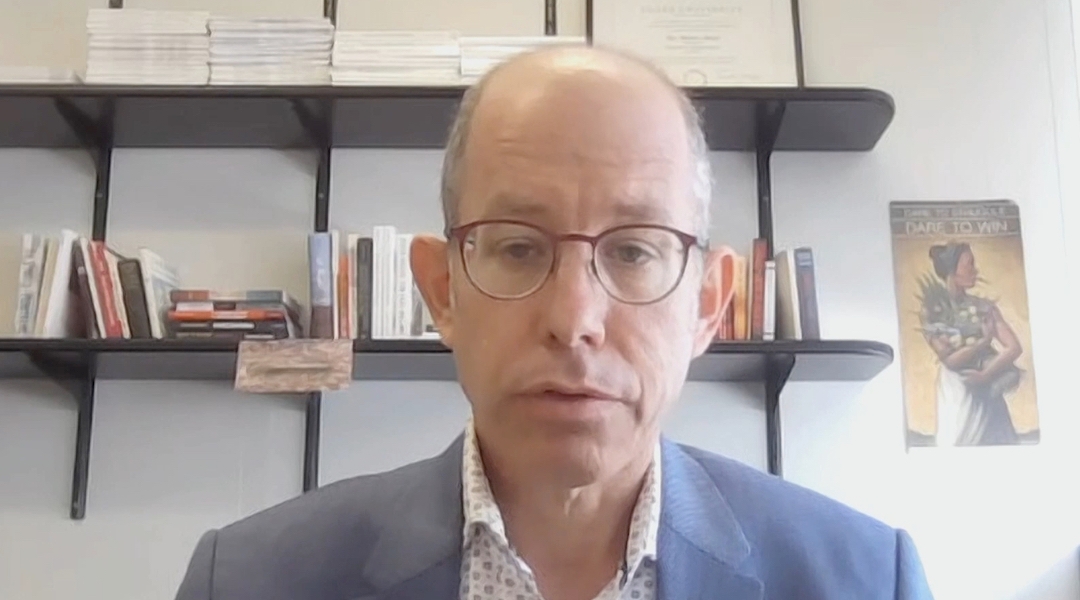U of Minnesota backtracks on Holocaust Center hire who accused Israel of genocide
Raz Segal faced pushback over a piece he wrote for Jewish Currents in the days after Oct. 7

Raz Segal discusses his Jewish Currents article in which he stated Israel intends to commit genocide in Gaza, Oct. 25, 2023. (Screenshot via NJ Spotlight News/PBS)
The University of Minnesota has “paused” the search for a new director of its Center for Holocaust and Genocide Studies after initially tapping an Israeli who accused Israel of genocide less than a week after Oct. 7.
Jewish groups had opposed the planned hiring of Raz Segal after learning of it last week, and two members of the center’s advisory board — one of whom is Jewish — resigned over the appointment. Segal, who is currently the director of a Masters program in Holocaust and Genocide Studies at Stockton University in New Jersey, had written a controversial piece in the progressive magazine Jewish Currents on Oct. 13 in which, citing his background “as a scholar of genocide,” he said Israel’s military campaign in Gaza was “a textbook case of genocide unfolding in front of our eyes.”
The university had initially defended Segal’s hire for its Twin Cities campus, saying in a statement over the weekend that he “was enthusiastically recommended by the search committee for this important position” after an assessment of “strengths and weaknesses/pros and cons of each candidate it interviewed.”
But amid mounting pressure — including the board resignations as well as opposition from the local Jewish Community Relations Council — the school reversed course on Monday.
“In the past several days, additional members of the University community have come forward to express their interest in providing perspective on the hiring of the posit[i]on of Director of the Center for Holocaust and Genocide Studies. Because of the community-facing and leadership role the Director holds, [i]t is important that these voices are heard,” interim president Jeff Ettinger said in a statement, according to TC Jewfolk.
The statement added that Ettinger “has paused the Director selection process to allow an opportunity to determine next steps.”
Some notable Jewish scholars were also beginning to criticize Segal’s appointment. “There would, of course, be no problem whatsoever with having the center headed by someone who is critical – even sharply critical – of the policies of the Netanyahu government, or of any other Israeli government for that matter,” Menachem Rosensaft, an adjunct law professor at Cornell University and former counsel of the World Jewish Congress, wrote in a Times of Israel op-ed Tuesday. “Segal’s radical views, on the other hand, lie so far outside the mainstream as to constitute a Hamas-like endorsement for the genocidal elimination of the State of Israel.”
The directors of the Jewish Community Relations Council of Minnesota and the Dakotas praised the university’s reversal and insisted local Jews be given a bigger voice in the center’s eventual hire. They said that, unlike in years past when the center’s director position had been open, no one from the JCRC had been consulted this time on the search committee.
“As the University determines its next steps, we expect that the consensus perspective of Minnesota’s Jewish community, as well as that of mainstream Holocaust and genocide scholars, will be honored,” director Steve Hunegs and deputy executive director Ethan Roberts said in a statement.
The university’s Jewish community has been on edge in recent weeks. Vandals broke several windows and doors at Minnesota Hillel over the weekend. And last month, as part of a controversial deal the university administration made with its pro-Palestinian encampment movement, representatives of the encampment made a formal argument for divesting from Israel to the school’s regents (with student Hillel representatives providing a counter-argument).
Segal, who has praised the encampment movement, is not the only Holocaust and genocide scholar to call Israel’s actions in Gaza a genocide — though he was among the earliest and most emphatic. Dozens of other faculty members focusing on the discipline signed onto an open letter Segal spearheaded in the days after Oct. 7 that condemned Hamas’s actions while arguing that Israel’s campaign in Gaza at the time was “raising the question of genocide.” Israel, which was taken before the International Criminal Court on the charge of genocide, has emphatically denied the charges.
The rise of such views among a corner of Jewish and Israeli academics has been cause for alarm among some pro-Israel Jewish groups, which have organized at some universities to keep left-leaning Jewish faculty off key antisemitism-related positions.
In her resignation letter from the Holocaust and genocide center’s advisory board, faculty member Karen Painter cited Segal’s Jewish Currents essay as a reason why she viewed his hire unacceptable.
“Dr. Segal has positioned himself on an extreme end of the political and ideological spectrum with his publications on Israel and Gaza, including an essay in which he accused Israel of genocide a week after the October 7 terrorist attacks,” wrote Painter, whose husband, former George W. Bush administration official Richard Painter, has brought complaints triggering a federal Title VI antisemitism investigation at the university.
Bruno Chaouat, a Jewish former director of the center, also resigned over the appointment.
This article originally appeared on JTA.org.
A message from our Publisher & CEO Rachel Fishman Feddersen

I hope you appreciated this article. Before you go, I’d like to ask you to please support the Forward’s award-winning, nonprofit journalism so that we can be prepared for whatever news 2025 brings.
At a time when other newsrooms are closing or cutting back, the Forward has removed its paywall and invested additional resources to report on the ground from Israel and around the U.S. on the impact of the war, rising antisemitism and polarized discourse.
Readers like you make it all possible. Support our work by becoming a Forward Member and connect with our journalism and your community.
— Rachel Fishman Feddersen, Publisher and CEO





















